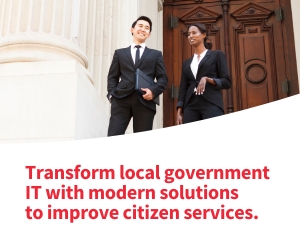STATETECH What aspects of AI did your 2023 TAGITM presentation touch on?
SEMPLE: It’s going to change the way we do our jobs. We’re getting more general-purpose AI tools; that’s starting to drive some of the current and near-future changes.
I talked through some of that, and then gave practical examples of where AI can change government in ways they maybe hadn’t thought of, like our animal shelters or court systems. And I wanted to talk through some of the drawbacks and risks of fake information.
A big thing for our local animal shelter, and I’m sure many around the country, is that we don’t have a large staff taking care of a lot of animals. If we look at AI tools that can help monitor the animals and their behavior patterns — and when those behavior patterns change — AI tools can give direction to the staff that an animal might need some additional care.
Also, having some self-service tools with AI to help people get matched with the right animals for their lifestyle, based on interactive questions and data about the animals — there are a couple of ways to improve things.
STATETECH If you were to give a presentation on AI now, what would you update or change?
SEMPLE: It’s such a rapidly developing field; it’s hard not to be behind as soon as you hit save on the PowerPoint slide.
I probably didn’t include enough about developing guidelines and policies. We had some discussion, especially at the end, about opportunities and partnerships and how we can leverage this.
READ MORE: StateTech’s conference coverage of TAGITM 2024.
STATETECH How are governments utilizing AI, or how could they be using the technology?
SEMPLE: There are obviously internal benefits if we start using more AI-based cybersecurity tools. For example, some of the bad actors are using AI-based tools that help create better spear-phishing campaigns. So, we need some automated and AI-based tools on the cybersecurity side.
On the more public-facing side, I’ve seen several examples of generative AI tools that are used to communicate, in terms of answering questions folks ask in natural language, with data pulled from the website and other documents the governments have. There is a good chance to increase citizen engagement with some of those tools.
STATETECH How can governments use AI responsibly?
SEMPLE: The biggest thing for us was not to completely block the use of those tools. This is one of those consumer-level technologies now. Folks are going to use it, whether we bless it or not.
Everything you type into ChatGPT becomes property of OpenAI, so we needed to get information out there about that. We published guidelines for our users on how to use AI tools safely and ensure we’re not putting sensitive information out that’s not for public release.
We walked them through a number of scenarios and said don’t rely on generative AI to give you an accurate answer. While it may help you write a letter to a particular audience, the content is still your responsibility. You need to check it afterwards.












